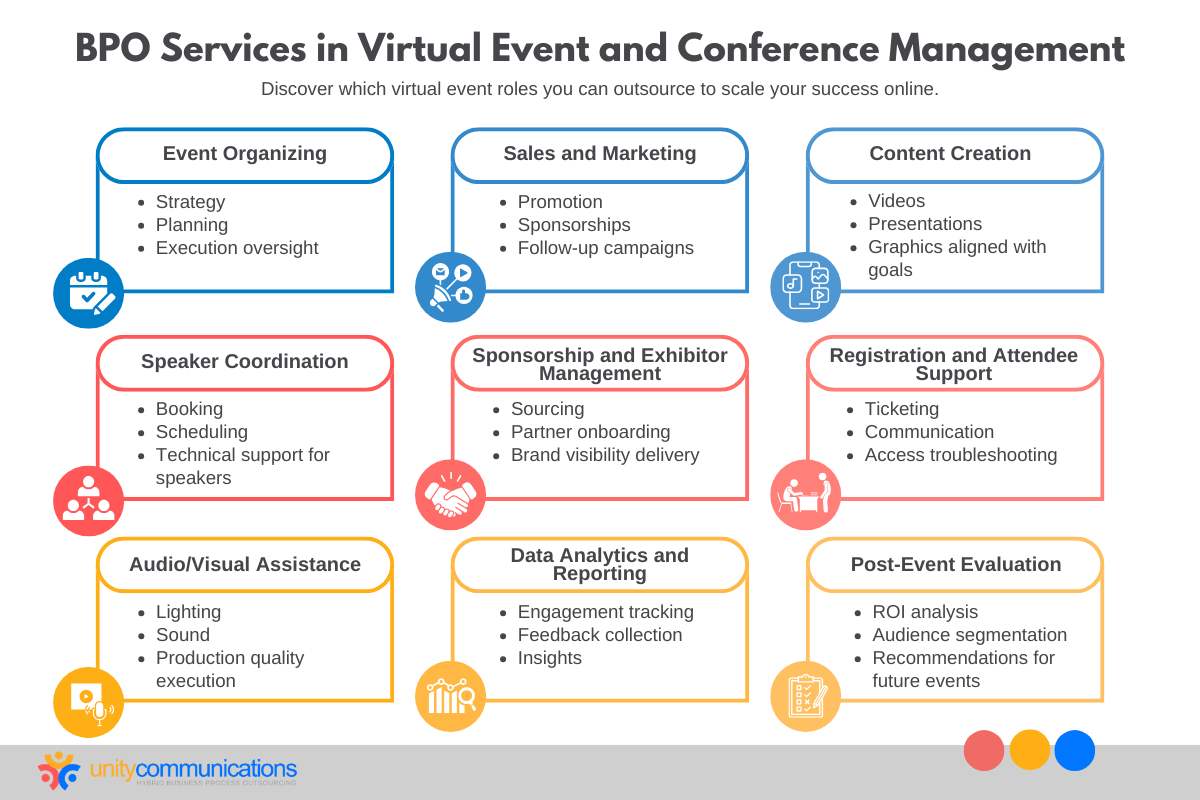IN THIS ARTICLE
Table of Contents
Do you find hosting virtual events or conferences challenging? If so, outsourcing virtual event management to a business process outsourcing (BPO) company may be the path for you.
With online events and virtual conferences becoming the norm, you may need to increase your workforce. Finding staff for your virtual and physical events requires extensive preparation. Planning is also much harder if you do not know what the event staff should do.
This article discusses the role of BPO providers in managing virtual events, the functions they can help with, and the benefits of outsourced virtual event management.
BPO Services in Virtual Event and Conference Management

Did you know you can employ a BPO firm to manage virtual events? Or are you among the people who are unfamiliar with what BPO is? Fret not!
BPO involves outsourcing a function to a third party who can perform and manage it more efficiently at a fraction of the cost of doing it in-house. This strategy lets you hire an external team to host a virtual event on your behalf and scale your online event programming.
Third-party professionals can easily handle high-stakes live event tasks, from development and event promotion to technical assistance and post-event support. They can also manage the expected increase in virtual and hybrid events, as over 77% of respondents prefer virtual over face-to-face meetings because of their ease of attendance.
Depending on your online event’s size, you may need to add multiple staff members to each role for sufficient coverage. Similar to an in-person event, the format of online events can vary. Outsourcing also lets you design your staffing to work best with your situation.
Here are some common virtual event management roles and responsibilities you can outsource:
- Organizing, similar to project management, oversees the development and execution of the event’s objectives, strategy, and wrap-up.
- Sales and marketing develop promotional materials, cultivate sponsorships, and handle post-event promotion.
- Content creation and management involves developing engaging content for virtual events (presentations, videos, graphics, etc.), managing content calendars and schedules, and ensuring content aligns with the event objectives.
- Speaker management involves recruiting and coordinating with speakers and presenters, managing speaker and presentation schedules, and providing technical guidelines and support.
- Sponsorship and exhibitor management involves attracting and managing event sponsors and exhibitors, coordinating with sponsors for branding opportunities, and ensuring sponsors receive the visibility and benefits outlined in agreements.
- Registration and attendee management involves handling event registrations and ticketing, managing attendee communication and inquiries, and providing support for login and access issues.
- Audio/visual management involves assisting with lighting and audio design, equipment setup, and training to ensure the event looks professional.
- Data analytics and reporting involve collecting and analyzing information related to virtual event performance, generating reports on attendee engagement and feedback, and providing insights for future event improvements.
- Post-event reporting involves gathering data and creating meaningful reports to evaluate return on investment (ROI), refine target audiences, and shape future programming.
How BPO Services Optimize Virtual Event and Conference Management

Now that you know the different roles to outsource when planning an online event, let’s explore how BPO teams design a successful virtual event. From using the right virtual event technology and setting tech rehearsals to hiring the right people, third-party service providers employ various strategies to ensure your online event’s success.
Here are a few virtual event management best practices BPO vendors follow to provide a streamlined, professional experience.
Identify the Audience
In a survey, nearly 74% of event planners indicated that hosting virtual events yielded a positive return on investment (ROI) within six months. Many organizers perceive virtual events as a straightforward and efficient means of accomplishing their business objectives.
Virtual events are also an opportunity to connect with new, global audiences and allow for more participants beyond the limitations of a physical venue.
One way BPO companies manage virtual events is by researching who will attend them and understanding their goals and challenges. The target audience affects almost all aspects of the event, such as the discussion points, invited speakers, and even the duration of the event. These insights identify how to inspire participants to register and how best to deliver value.
Craft the Event Strategy
Various marketers tried to repackage in-person events as virtual ones during the pandemic. However, online events need an entirely different strategy. After all, the technology, medium, and participants’ interactions are very different.
BPO firms can help manage virtual events by creating well-rounded strategies that meet the client’s budget, goals, and action plan. They start by finding the “why,” or primary purpose, of the event. Does the event marketer want to drive revenue, improve brand awareness, or increase memberships? What does the audience want from the event?
One example is Google’s SheetsCon, a conference exclusively designed for Google Sheets users. The event engaged its audience through detailed tutorials and presentations by experts.
The organizers of SheetsCon effectively boosted engagement by incorporating giveaways. Participants were encouraged to share information about the event on social media or explore sponsor pages during the conference. This strategy effectively promoted both the event and its partners.
Ease Audience Interaction and Networking
Engaging people during in-person events is difficult; shifting the event online poses a greater challenge as you must compete against unwanted distractions.
Teaming up with a BPO provider to manage virtual events helps you find interaction opportunities for participants. It can also build opportunities for audience participation by performing a pulse check at the event’s start, implementing a brainstorming session in between, and having a question-and-answer portion towards the end.
Events with a physical component make it easier to engage the audience. However, one must think outside the box when hosting a virtual event. For example, your third-party team can send attendees into breakout rooms since individuals are more likely to be active in smaller groups. A BPO partner can go a long way toward helping the audience participate.
Promote the Event Before, During, and After
Whether hosting a virtual or in-person conference, you must promote the event to gather attendees. Event promotion should take place before, during, and after the event. For example, 96% of event organizers intended to broadcast live since viewers dedicate eight times more time to live video and event updates than prerecorded content.
The BPO team can plan partner or paid promotions, post live event updates on social media, or send ‘thank you’ emails afterward. They can also tap into your network and ask them to spread the word for you.
Another vital part of a promotion that BPO providers can help with is event branding. This function involves highlighting your logo and tagline, adding links to your website, and showcasing promotional materials. It aims to create strong branding, shape brand awareness, and maintain consistency across your channels.
Conduct Tech Rehearsals
Online conferences rely heavily on technology. However, technology is not always reliable. Your attendees will also likely have different comfort levels with technology. Hence, BPO teams must perform tech rehearsals when managing virtual events.
They often conduct practice sessions with the crew and speakers and draft a fallback plan should the unexpected happen. To combat the varying technological skills, BPO teams also perform a trial run of the event from the attendees’ perspective.
This rehearsal can include sending a message via chat, clicking on links, or launching multiple sessions. Depending on people’s preferences, the third-party team may also test different virtual event platforms to enhance accessibility.
Benefits of Outsourcing Virtual Event and Conference Management

Corporate communications and marketing teams must host virtual events effectively. In-person events have inherent risks, but the lack of experience in virtual events entails considerations such as connectivity, technology, and audience engagement.
Nobody has the resources or time to do all that. Outsourcing virtual event management solves a host of problems. Here are the strategy’s benefits you must know:
- Maximizes the return on effort and time. Small teams spend three to four weeks organizing virtual events. Most teams cannot accommodate the extra workload with their existing resources. Outsourcing saves time and solves resource challenges. The event organizer must only arrange the content; the provider will do the rest.
- Provides expertise in hosting. According to reports, nine in 10 virtual event participants leave early due to an unengaging experience. The competition for online audiences is high, so keep the event as engaging and professional as possible with an external provider.
- Improves costs and accessibility. Virtual events save 75% of the cost of a physical event. However, you can save more when you outsource the planning and execution to a BPO firm. The third-party partner has all the resources necessary to ensure success—resources that may otherwise be unavailable to you.
- Sorts technical problems. A congested network, poor broadband connectivity, and unstable event platforms are examples of tech issues that may arise during your event. BPO teams solve the technical issues of managing virtual events with full local support, teleconferencing, and presenter troubleshooting.
The Bottom Line
Outsourced virtual event planning services handle events with unmatched attention to detail.
A successful online event requires meticulous planning. Business owners often face a time crunch when personally managing event planning activities. Hiring an external provider makes sense, as they have a skilled team of experts available on demand.
Want to know more about outsourcing and the different functions you can offload? Let’s connect!





